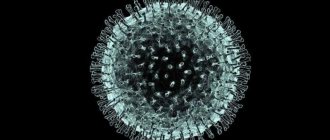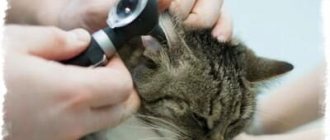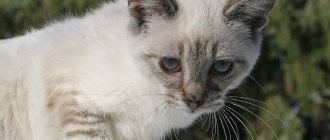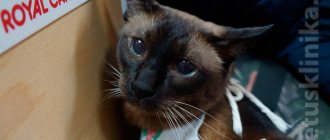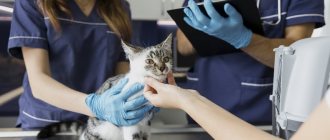Gastroenteritis is hemorrhagic inflammation of the gastrointestinal tract. In animals, various reasons can lead to its development, the most common of which is infection with the intestinal virus FCoV of the Coronaviridae family. The Latin name for the disease is Feline Infectious Peritonitis (FIP). Coronavirus gastroenteritis in cats is a very common disease. This is explained by the high degree of virulence (infectivity) of the virus, as well as the fact that dogs, pigs, and wild felines can be carriers of the infection.
Routes of infection
The FCoV coronavirus enters a cat's body orally or nasally if a particle of feces from a sick animal enters its mouth or nose. The virus can remain viable in the external environment for up to 7 days, and in the body of an animal carrier it can survive in “sleep mode” for up to a year until it receives favorable conditions for reproduction.
The disease is most often registered in cats under the age of two years, as well as in individuals older than 10-12 years. Cats kept in large groups are at greatest risk: residents of nurseries and cat shelters. Domestic cats, which have little contact with their relatives, according to statistics, account for less than 10% of cases of the total number of coronavirus gastroenteritis. The risk of human transmission of infection to a domestic cat is small, but still exists. This is possible if feces of an animal sick with coronavirus gastroenteritis gets on the clothes or hands of the cat owner.
Important! A cat sick with coronavirus gastroenteritis cannot infect a kitten through the placenta during its fetal development. But after the birth of kittens, it is recommended to isolate them from their sick mother.
Causes
Feline gastroenteritis occurs for the following reasons:
- Traumatic injury when swallowing hard objects - fish bones, small toys.
- Formation of trichobezoars from hairs swallowed during licking. Long-haired cats are primarily affected.
- Sudden change of food.
- Eating food from the hosts’ table - fried, salty, smoked, sweet.
- Mixing dry granulated food with natural products.
- Poisoning by mice caught during deratization with anticoagulants.
- Complications of chronic non-communicable diseases.
- Side effects of medications.
- Contagious diseases of infectious or parasitic etiology.
- Formation of tumors.
Symptoms
The FCoV virus, having entered the cat’s body, “nests” on the intestinal mucosa. In the presence of favorable conditions (a decline in the animal's immunity, stress, poor nutrition), the infectious agent begins to multiply rapidly, causing inflammation of the intestinal mucosa, and then the stomach. The secretory and motor functions of the gastrointestinal tract are disrupted, and catarrh of the stomach and intestines develops.
Signs of gastroenteritis in cats are usually quite pronounced and difficult to ignore. This:
- diarrhea,
- vomit,
- poor appetite
- blood and mucus in stool
- in severe cases - elevated temperature.
The animal becomes apathetic, stops grooming itself, and has a dull look. When you try to drink water or eat something, you experience “dry” gagging.
Attention! Often the cat owner mistakes the above symptoms for a common intestinal disorder and tries to cure the pet on his own. This cannot be done: coronavirus gastroenteritis can be fraught with serious consequences. If not properly treated, the relatively harmless FCoV virus can mutate into a highly virulent strain of FIPV that causes peritonitis, often leading to death.
If your cat is sick with coronavirus enteritis
That is, if a cat gets sick with coronavirus enteritis, this means that a virus has begun to live and develop in its intestines, which seeks to multiply and expand its habitat. If the virus is of low pathogenicity or the cat has a strong immune system, the virus may be removed from the body or its spread may be suppressed. In this case, there may not even be any visible signs of illness. But since the main goal of the virus is reproduction, one of the methods to achieve this goal is mutation. Moreover, it is in a form that can reproduce in the very cells designed to fight it. Once this is achieved, infected macrophages (blood cells that normally kill the virus), traveling throughout the body, spread the virus to all organs. The body senses danger, produces even more macrophages - and this is all the virus needs - these are no longer enemies for it, but “food”. This is how a terrible disease begins - feline viral peritonitis.
Wet and dry peritonitis
What kind of peritonitis an animal will develop – wet or dry – directly depends on the animal’s cellular immunity. If the immunity is strong or moderate and the body is struggling, then it develops slowly, according to the dry type. If the immune system is weak, wet (effusion) peritonitis develops very quickly.
Diagnostics
If a cat has symptoms of gastroenteritis, to determine the cause of its development
A history and physical examination are not enough. It is necessary to conduct a number of laboratory and hardware studies. Blood and feces are taken from the animal, the test results of which can reveal problems with other organs that have led to disruption of the gastrointestinal tract. Bacteriological and virological analysis of vomit and gastric lavage may also be required.
One of the informative diagnostic methods is ultrasound, which makes it possible to detect the presence of dynamic intestinal obstruction or foreign objects in the gastrointestinal tract, changes in the structure of its walls. In some cases, to increase the reliability of such an examination, the cat is prescribed an abdominal x-ray.
Types of coronavirus
There are two strains of the virus:
- intestinal (FCoV) - lead to the development of enteritis;
- highly pathogenic (FIPV, FIP) - interpretation of infectious peritonitis virus.
In the first case, the disease is tolerated by the cat relatively easily. Sometimes the owner does not even notice the pet’s ailments. Pathogens affect the mucous membrane of the small intestine, which is accompanied by diarrhea. The second option develops against the background of the first as a result of a mutation of the strain, if the animal is exposed to frequent stress and becomes hypothermic. Peritonitis of infectious origin is often fatal due to the destruction of immune macrophage cells.
Despite the identical origin of these two species, the manifestations are different. For example, a cat infected with intestinal coronavirus will not necessarily develop infectious peritonitis. Even with an acute course of the disease in an animal, there may not be a dangerous virus in its feces.
Treatment
Therapy for coronavirus gastroenteritis in cats is aimed at suppressing the vital activity of the infectious agent, relieving the symptoms of inflammation of the gastric and intestinal mucosa and restoring the vitality of the animal.
To combat the FCoV virus, drugs are used:
- Glycopene is an immunomodulatory agent that activates the production of phagocyte cells;
- Globcan-5 is a polyvalent immunoglobulin containing antibodies to viruses;
- Lykopid - destroys pathogenic and viral microorganisms in the body;
- Roncoleukin is an immunostimulant that increases cellular and humoral immunity. Most cats respond well to supportive care. When treating coronavirus gastroenteritis, medications for diarrhea, gastroprotectors that protect the gastrointestinal mucosa, antiemetics, anti-inflammatory and antispasmodics will be used.
For coronavirus gastroenteritis, it is recommended to put the cat on a one- to two-day starvation diet, and then for several days give only semi-liquid, easily digestible food. It is necessary to ensure that the cat consumes at least 50 ml of water per 1 kg of weight per day. If your pet refuses to drink, you can try pouring water into the cheek using a syringe without a needle. If your cat is dehydrated, your doctor may prescribe intravenous infusions of an isotonic solution of sodium chloride and glucose.
In the vast majority of cases of cats contracting coronavirus gastroenteritis, the prognosis for recovery is good if the diagnosis is made in a timely manner and treatment is started at an early stage.
If the cat has good immunity and no concomitant diseases, the elimination process is possible - the body’s independent destruction of the infectious agent. In such cases, the animal recovers fairly quickly without the use of any therapeutic measures. However, it is almost impossible to completely remove coronavirus from the body, and the cat will remain a virus carrier.
Tests and diagnostics for coronavirus
If your cat is infected with coronavirus, it is important to start treatment as early as possible. And for this, it is better to play it safe and get tested, even if your pet has no visible signs of illness. After all, virus carriage can persist without clinical manifestations. This way you can protect other pets living in the house.
There is no specific test for detecting KVK infection. Diagnostics includes several stages:
- ICA/ELISA of blood or plasma . Determines the concentration of antibodies to the virus. A reduced level indicates weak immunity, when the animal’s body is not able to adequately repel pathogenic attacks, but this does not mean the absence of infection. If the virus is present, the test is positive, but where it is localized (in the tissues or intestines) is unknown.
- PCR/ICA of feces . Allows you to detect the virus in cat feces. A positive reaction indicates that the animal is infected, which requires its complete isolation from the rest - healthy ones. If the test is negative, the cat may be a carrier of the virus without releasing it into the external environment.
- Donating blood for PCR to detect coronavirus in cats . This is one of the most inaccurate methods, often showing erroneous indicators.
- Antibody titer . Makes it possible to determine the amount of antibodies in the blood serum, which shows the degree of damage. Based on the established values, the doctor can prescribe the correct treatment regimen and give an accurate prognosis of the development of events.
The simplest methods for laboratory diagnosis of infectious peritonitis are biopsy and histological examination of tissue. Only these are complex and expensive procedures that are not carried out in every veterinary clinic. It happens that to establish an accurate diagnosis you have to resort to a number of analyzes and tests.
It is possible to establish feline coronavirus only after passing more than one test
What to do if the test is positive
If the analysis shows a positive reaction, additional testing is required. It includes:
- blood biochemistry;
- titer test for the content of protein fractions in the blood;
- repeat serological analysis.
If infection with peritonitis is confirmed, the animal is prescribed a puncture from the peritoneum. This is done to examine the accumulated liquid.
This is what a test with a positive result looks like
The owner himself does not need to panic in such a situation. It is not a fact that the infection will develop into a complicated form that cannot be treated (FIP). What to do first:
- If possible, remove healthy pets from sick ones. If this does not work out, each animal has its own tray, bowl, and scoop. Toilets should be as far away from the feeding area as possible.
- Clean the trays daily and treat them with disinfectants (for example, bleach). It’s better not to add filler at all. After washing the bowls, pour boiling water over them. Change drinking water twice a day.
- Change the textiles in the room to ones that can easily be washed frequently. It is advisable to remove carpets as it will be difficult to clean them regularly. In this case, a vacuum cleaner is not the best solution, since the air flow will spread the infection.
- Install ionizing air purifiers in the room. If possible, periodically turn on UV lamps, which are good at killing germs.
- Spray a herbal infusion of chamomile and oak bark into the animal's mouth once a day. In addition to its disinfecting effect, it strengthens the mucous membrane.
- Cancel all planned events: mating, visiting exhibitions, etc.
- Transfer your pet to a special diet. Eliminate everything fatty.
- Try to exclude any acute experiences in the animal. So, for the next 2 months you cannot carry out castration (sterilization) or anything else that can cause stress.
Unfortunately, with coronavirus there is no talk of a complete recovery. When this infection is detected in an animal, the veterinarian prescribes symptomatic treatment for the animal, which allows it to locally combat pathologies that manifest themselves externally (liver dysfunction, prolonged diarrhea, ascites as a result of fluid accumulation in the abdomen). Therapy is aimed at stabilizing the pet’s general condition.
PCR tests (Polymerase chain reaction)
Prevention
To prevent the development of coronavirus gastroenteritis in a cat, veterinarians recommend:
- Try to ensure that your pet communicates less with strangers, especially street relatives.
- Wash your hands after contact with other people's animals.
- When breeding an animal, make sure that the partner chosen for it is healthy.
- The cat's feeder and water bowl should be located away from the litter tray.
- It is advisable to use clumping mixtures that produce little dust as filler.
There is no vaccine that can provide a 100% guarantee of protecting cats from infection with coronavirus. According to veterinarians, the intranasal vaccine Primucell works well. It is produced by the American pharmaceutical company Pfizer. The drug is made on the basis of a weakened strain of FCoV and FIPV; its action causes the cat’s body to produce a limited amount of antibodies against coronavirus.
Preventive measures
To protect your cat from infectious diseases, it is necessary to do preventive vaccination on time (carried out once a year). It is necessary to constantly protect the animal from possible infections:
- Treat your cat for worms and fleas, which can be carriers of infection.
- Do not walk around the apartment in street shoes (infection can be brought on on the soles).
- Do not allow your pet to interact with sick cats.
- For feeding, use only high-quality and fresh products.
- Do not give dirty water to drink.
- Do not let your cat go outside if it is not vaccinated.
In the case of enteritis, days count. If diarrhea and vomiting appear, you should not hope that the disease will disappear on its own. Without medication and diet, intestinal inflammation does not go away. You should also not self-treat the animal. Enteritis is similar in symptoms to other diseases; you can unknowingly start giving inappropriate medications. Only a veterinarian, after a thorough examination and a series of tests, will determine the cause of the animal’s poor health and select the necessary medications.
Do kittens get sick and how are they treated?
Kittens also suffer from coronavirus.
Coronavirus infection is not very selective in terms of choosing the target of infection. Any animal, regardless of breed and age, can get it. Scientists are still puzzled as to why some organisms are more resilient. But based on veterinary practice, the most vulnerable groups of cats can be identified: albinos, elderly males and kittens.
Despite the inability to become infected in the womb, a month after birth a cat can become infected with coronavirus. Typically, symptoms clearly manifest themselves when the baby is separated from the mother cat. Kittens up to one and a half years old have a weakened immune system, so in the event of a viral infection, the body is unable to resist the pathogen. Immune protection stabilizes in cats by the age of two.
If a kitten is infected, treatment will be the same as for an adult cat. The only thing is that age restrictions are taken into account when taking a number of drugs. Therefore, it is not recommended to give any medications on your own.
